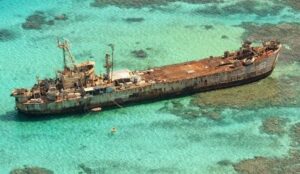
China Coast Guard drives away Philippine vessels intruding into waters of China’s Nansha Islands
China ‘fully prepared’ for any possible situations around Ren’ai Reef
Manila should have strategic autonomy ‘rather than being used by foreign forces’
As China and the Philippines have been quarrelling over the Philippines’ illegal transportation of construction supplies to China’s Ren’ai Jiao (also known as Ren’ai Reef), in order to incite Manila to further provoke China to ramp up the tension, several Western countries led by the US have expressed backing for the Philippines’ illegal acts in the South China Sea while condemning China’s legitimate, restrained and professional responses.
The Chinese Foreign Ministry, for the second time in days, urged the Philippines to immediately tow away the military vessel “grounded” at the reef and restore it to its original state of having no personnel or facility on it, according to a Tuesday statement from the ministry, stressing that Ren’ai Reef is part of China’s Nansha Qundao(Nansha Islands).
“The Philippines explicitly promised several times to tow away the military vessel deliberately and illegally ‘grounded’ at Ren’ai Jiao. However, 24 years have passed and instead of towing it away, the Philippines has sought to repair and reinforce it on a large scale in order to permanently occupy Ren’ai Jiao,” reads the statement.
Also on Tuesday, Wu Qian, a spokesperson of the Chinese Ministry of National Defense, said, in response to US Defense Department’s latest statement on the matter, that “the US remarks disregard the facts and baselessly accuse China of its legitimate and lawful maritime law enforcement actions. China firmly opposes this.”
US Defense Department spokesperson Patrick Ryder said on Sunday on X (formerly Twitter) that “We stand with our Philippine allies in condemning the PRC’s efforts to impede lawful operations at Second Thomas Shoal.”
Wu said “The US is not a party to the South China Sea issue and has no right to interfere in it. We demand that the US immediately stop using the South China Sea issue to stir up trouble and sow discord, and genuinely respect China’s territorial sovereignty and maritime rights and interests in the South China Sea, as well as the positive efforts made by regional countries to maintain peace and stability in the South China Sea.”
The China Coast Guard (CCG) vessels have lawfully intercepted and taken warning enforcement measures. In the face of ineffective warnings through multiple verbal communications, water cannons were used as a means to avoid direct confrontation and collision, Wu noted.
The on-site operations were reasonable, legal, professional, and in accordance with regulations. China will continue to take necessary measures to firmly safeguard its national sovereignty and calls on the Philippines to abide by its commitments and immediately cease all provocative actions, said the Chinese Defense Ministry spokesperson.
The Chinese military will resolutely fulfil its duties and missions and firmly safeguard national sovereignty and maritime rights and interests, Wu said.
Analysts said that China is still insisting on a diplomatic way to solve the problem and China continues to urge the Philippines to fulfil its promise, and that Chinese law-enforcement forces will not harm the personnel of the Philippines but will stop Manila from reinforcing the military vessel in the region.
If the US military gets itself involved and incites Manila to further provoke China to worsen the tension, the Chinese military is also fully prepared for any possible escalated situation to effectively safeguard China’s sovereignty and legitimate rights, even though China does not want the tension to escalate.
On Tuesday, the CCG released a video clip showing how the CCG ship reacted with rational restraint throughout the process. Time stamped at 9:40 am on August 5, the video lasting 2 minutes and 40 seconds showed that the CCG ship 5201 launched warning water cannon against a Philippines vessel.
Analysts who watched the video told the Global Times on Tuesday that the CCG ship did not change its course throughout its operation and it was when the Philippine boat gestured its determination to rush into the waters near the Ren’ai Reef that the Chinese side fired water cannon at it to warn it and drive it away. The CCG had demonstrated great restraint in its actions in the face of the Philippines’ intrusion.
It is precisely because of China’s professional restraint, rather than the wilful use of force like some other countries would have done in similar cases, that the incident has not turned into major collision, Tian Shichen, a retired Navy captain and founder of the independent think tank Global Governance Institution and director of the nongovernmental institute International Center for the Law of Military Operations, told the Global Times on Tuesday.
It was China’s law enforcement department that had engaged into the incident rather than Chinese military warships, which makes the nature of the conflict different, Tian pointed out. However, no country should be naive enough to see China’s restraint as that China would succumb, be intimidated or be forced to take concessions, Tian stressed.

China’s stance on demanding the Philippines to tow away the “grounded” warship has never been changed in the past years, nor will it change this time, Ge Hongliang, director of the China-ASEAN Maritime Security Research Center at Guangxi University for Nationalities, told the Global Times on Tuesday.
A spokesperson from China’s Foreign Ministry on Tuesday made clear that the cause of the current situation in the Ren’ai Reef is because the Philippine side ignored China’s goodwill and sincerity and went ahead with sending construction materials for repairing and reinforcing the “grounded” military vessel on a large scale.
Later on Tuesday, the Chinese Embassy in the Philippines released a statement saying that since the beginning of this year, China has proposed a number of maritime initiatives to the Philippines, including managing the situation on the Ren’ai Reef, and has been waiting for feedback from the Philippine side.
The South China Sea is not a “hunting park” for countries outside the region to make mischief and sow discord, the Chinese Embassy said, opposing any words or deeds that create tension and provoke confrontation in the South China Sea, and urging the US to earnestly respect China’s territorial sovereignty and maritime rights and interests in the South China Sea.
The spokesperson criticized the Philippines’ action as a grave violation of international law and the Declaration on the Conduct of Parties in the South China Sea (DOC) signed between China and ASEAN member countries.
Despite the dispute, China has continued to insist that it is open for dialogue to find a solution. In Tuesday’s statement, the Foreign Ministry spokesperson called on the Philippines to properly handle maritime issues through dialogue.
“China stands ready to continue to work with the Philippines to properly handle maritime issues through dialogue and consultation and jointly uphold bilateral relations and maritime stability,” the spokesperson ministry said.
During the meeting between Chinese Ambassador to the Philippines Huang Xilian and the Philippine Foreign Undersecretary Theresa Lazaro on Monday, Huang said the use of hype and the introduction of third-party actors will not help solve the issue, and will only complicate the situation. He called on the Philippines to start the negotiation process as soon as possible.
“China has been waiting for feedback from the Philippines and hopes that the two sides can launch dialogues as soon as possible to jointly safeguard peace and tranquillity in relevant waters,” reads a statement released by the Chinese Embassy in the Philippines.
Following the US, the European Union, Australia, Japan and Canada are among countries that have taken sides to support the Philippines while condemning Chinas legitimate actions over the Ren’ai Reef. Chinese experts reminded President Ferdinand Marcos Jr to steer the foreign policy of the Philippines out of its own national interests, not be led by the nose by other countries, especially by the US.
The Philippines’ position on issues relating to the South China Sea is well established but the Philippine government should not allow the dispute to overtake and even hinder the overall China-Philippines relationship or the sound economic cooperation between the two countries, Ge said.
The US has been brazenly bolstering the Philippines as it infringes upon China’s sovereignty, but those moves will not succeed, a spokesperson from China’s Foreign Ministry said in a Monday statement, criticizing that the US for having, in disregard of the facts, attacked China’s legitimate and lawful actions at sea aimed at safeguarding its rights and enforcing the law.
The US’s attempt to make an issue of the so-called South China Sea arbitration award, which violates international law, including the UN Convention on the Law of the Sea, will not affect China’s firm resolve to safeguard its territorial sovereignty, maritime rights and interests in accordance with the law, the Chinese spokesperson said. The spokesperson urged the US to stop utilizing the South China Sea issue to sow confusion and discord.
Ge told the Global Times that from the continuous hype from the Philippines, it can be said that Manila is clearly trying to “take advantage” or “gain improper interests” on the South China Sea issue with the help of the US. But such expedient speculation is not reasonable, and ultimately will lift a rock only to drop it on its own feet.
The US’ incitement over the dispute around the Ren’ai Reef could mislead the Philippines to take more provocative actions which could be unexpected or uncontrollable. Such incitement is tantamount to activating the promise of the US-Philippines alliance treaty, which means the Philippines would be dragged into a war between major powers, China and the US, or among regional countries. That is a recipe for disaster for the Philippines itself, Ge said.
Commenting on some voices from Western media saying that China was actually testing the bottom line of the US defense commitment to the Philippines by using water canon to drive away the Philippines’ intrusion, Song Zhongping, a Chinese military expert and TV commentator, told the Global Times that it is a matter concerning China’s territorial sovereignty. Whether the US would actually help the Philippines out or not will not sway China’s position to defend its territorial sovereignty and maritime rights.
Source: Global Times
AGS
